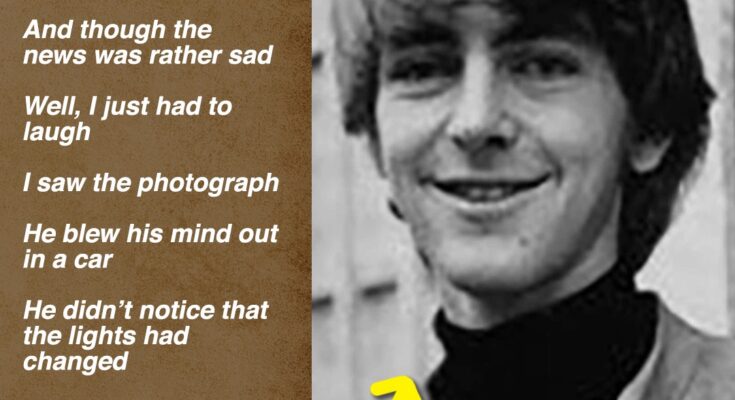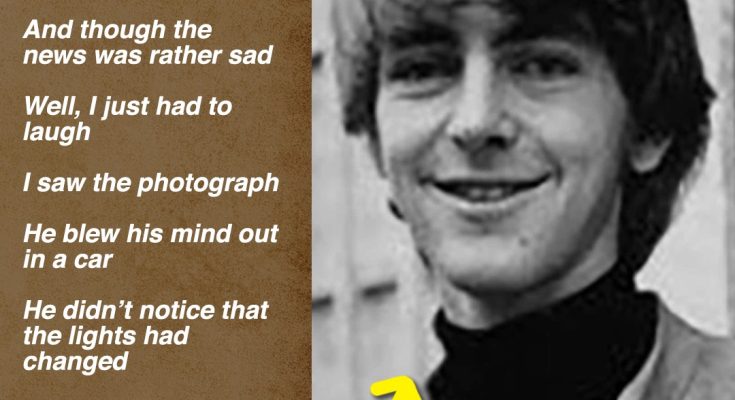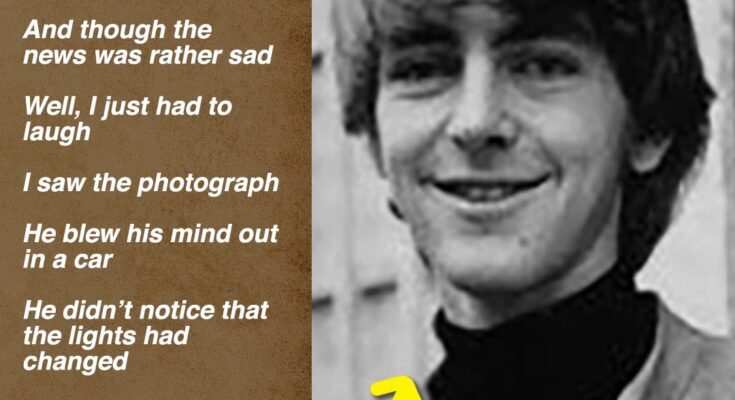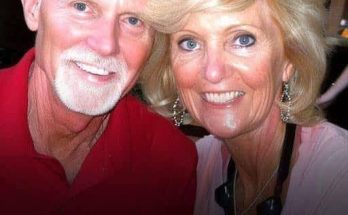
The Beatles made history, but they didn’t sing about it much. Even when they did, usually it was an oblique reference to a current event – something that for them was contemporary, but which has since gone into the history books.
In this way, larger historical currents did make their way into the band’s lyrics – albeit often metaphorically, or as quick one-liners. Here’s a sampling of the rare and subtle ways the Beatles commented on the world at large, and its past.
-
Photo: Unknown / Wikimedia Commons / Fair use
1855 VOTES‘A Day in the Life’ Referenced The Fatal Car Accident Of A Famous Swinging London Socialite
I read the news today, oh boy
About a lucky man who made the grade
And though the news was rather sad
Well, I just had to laugh
I saw the photograph
He blew his mind out in a car
He didn’t notice that the lights had changed
So begins what some consider the Beatles’ greatest song of all, the John Lennon/Paul McCartney collaboration “A Day in the Life.”
It turns out that the “lucky man who made the grade” wasn’t just a figment of Lennon’s imagination. He was 21-year-old Guinness heir Tara Browne, a fixture of the Swinging London scene, who fatally crashed his Lotus sports car in December 1966.
Lennon was quite literally “reading the news today” when he saw the story about Browne’s accident:
I was writing “A Day in the Life” with the Daily Mail propped in front of me on the piano.
What do you think?Fab factoid?
-
-
Photo: Ready Steady Go! / ITV
2779 VOTES‘She’s Leaving Home’ Was Based On The Story Of An Actual Runaway
Paul McCartney’s wry ballad “She’s Leaving Home” – the sixth track on Sgt. Pepper’s Lonely Hearts Club Band – was inspired by a February 1967 Daily Mail article he read about a 17-year-old girl named Melanie Coe, who had abruptly run away from home (though she was to return 10 days later). McCartney recalled:
This one is based somewhat on a newspaper report of a missing girl. The headline was something like “A-Level Girl Dumps Car and Vanishes.” So, I set out to imagine what might have happened, the sequence of events.
Oddly, Coe had already met Paul McCartney before she ran away. In 1963 she had won a miming competition on a TV music show where the Beatles were performing; McCartney was the judge and presented her with the award.
McCartney had no idea he had met Coe when he read the article, and she later had no idea the song was about her. Coe recalled her impressions of the song years later:
The amazing thing about the song was how much it got right about my life. It quoted the parents as saying “We gave her everything money can buy,” which was true in my case.… Then there was the line “After living alone for so many years,” which really struck home to me because I was an only child and I always felt alone.… I heard the song when it came out and thought it was about someone like me but never dreamed it was actually about me. I can remember thinking that I didn’t run off with a man from the motor trade, so it couldn’t have been me!
The miming contest, in which McCartney judged the girl who would inspire one of his songs over three years later, can still be seen on YouTube.
-
-
Photo: Unknown / Wikimedia Commons / Public domain
3558 VOTES‘Taxman’ Name-Checks Two Major UK Politicians
Midway through George Harrison’s complaint about the UK’s 95% “supertax” on the highest income bracket, come the following lyrics:
Don’t ask me what I want it for
(Ah, ah, Mr. Wilson)
If you don’t want to pay some more
(Ah, ah, Mr. Heath)The second line refers to Harold Wilson, Labour Prime Minister of the UK from 1964 to 1970 (and the man under whose auspices the supertax was passed through Parliament). The fourth line refers to his rival, Edward Heath, leader of the Conservative Party and Prime Minister from 1970-1974.
Although Heath, who once complained that there was “too much taxation chasing too little income,” did not support the 95% tax rate, his name was put into the song to provide some political balance. Perhaps the Beatles were taking care not to annoy their Labour-voting fans, who were no doubt numerous.
-
DID YOU KNOW?
Blackbird is also ranked #16 of 200 on The Best Beatles Songs
Photo: Rowland Scherman / Wikimedia Commons / Public domain
4859 VOTES‘Blackbird’ Is A Veiled Reference To The Civil Rights Movement
Although the American civil rights movement of the 1960s was happening on another continent, it didn’t escape the notice of Paul McCartney. He penned a song whose lyrics were a veiled reference to the struggles of African Americans:
Blackbird singing in the dead of night
Take these broken wings and learn to fly
All your life
You were only waiting for this moment to arise
McCartney later recalled:
I had in mind a black woman, rather than a bird. Those were the days of the civil rights movement, which all of us cared passionately about, so this was really a song from me to a black woman, experiencing these problems in the States: “Let me encourage you to keep trying, to keep your faith, there is hope.” As is often the case with my things, a veiling took place so, rather than say “Black woman living in Little Rock” and be very specific, she became a bird, became symbolic, so you could apply it to your particular problem.
-
Photo: Jones & Crosskill / Wikimedia Commons / Public domain
5526 VOTES‘Being For The Benefit Of Mr. Kite!’ Was Based On An 1843 Circus Poster
One of the odder tracks on Sgt. Pepper’s Lonely Hearts Club Band is “Being for the Benefit of Mr. Kite!,” a whimsical journey through a kaleidoscopic soundscape that purports to advertise a circus performance by the eponymous Mr. Kite, joined by “the Hendersons” who are “late of Pablo Fanque’s fair.” Like a carnival barker, the song offers a rundown of the amazing feats Mr. Kite will perform:
Over men and horses,
Hoops and garters,
Lastly through a hogshead of real fire.
In this way, Mr. K will challenge the world!
The song was written by Lennon, and he based most of the lyrics on an old poster he bought at an antique store while taking a break from filming the promotional film for “Strawberry Fields Forever.”
Lennon later recalled:
I wrote that as a pure poetic job, to write a song sitting there. I had to write because it was time to write. And I had to write it quick because otherwise I wouldn’t have been on the album. So I had to knock off a few songs.… The whole song is from a Victorian poster, which I bought in a junk shop. It is so cosmically beautiful. It’s a poster for a fair that must have happened in the 1800s. Everything in the song is from that poster, except the horse wasn’t called Henry.
The poster advertises “Pablo Fanque’s Circus Royal”; Fanque himself was an intriguing character in his own right. A master horseman and acrobat, and apparently the first Black circus owner in British history, Fanque shot to the top of his profession and stayed there for decades, remaining one of the most beloved circus impresarios of the Victorian era.
-
Photo: RuthAS / Wikimedia Commons / CC-BY 3.0
6557 VOTES‘Back in the USSR’ Mentions A Now-Defunct British Airline
There’s not much history in “Back in the USSR” – it’s a rapid-fire tour through Soviet locations and culture mixed with a good-natured Beach Boys spoof – but it does manage to reference two institutions which, though alive and well when the song was recorded, are now long-defunct. The first, of course, is the Union of Soviet Socialist Republics. What’s the second? It’s called out in the opening lyric:
Flew in from Miami Beach BOAC
Didn’t get to bed last night
On the way the paper bag was on my knee
Man, I had a dreadful flight
What’s BOAC? Turns out it stands for British Overseas Airways Corporation, which was formed in 1940. In 1974, BOAC merged with British European Airways (BEA) to form British Airways.
-
Photo: Unknown / Wikimedia Commons / Public domain
7442 VOTES‘Revolution’ Uses Mao Zedong As A Stand-In For Radicalism Gone Too Far
As a band, the Beatles were seldom political; as individuals, they often were. John Lennon, in particular, would become increasingly vocal about political causes after his marriage to Yoko Ono and the beginning of his solo career. While a Beatle, though, he made only one real reference to the political unrest of the late 1960s: the 1968 single ‘Revolution.’
The song acknowledges the legitimacy of progressive political causes while cautioning against overdoing things or resorting to violence. “We all want to change the world,” Lennon concedes, but then says, “When you talk about destruction/Don’t you know that you can count me out.”
One verse adds:
But if you go carrying pictures of Chairman Mao
You ain’t gonna make it with anyone anyhow
Lennon later told Rolling Stone magazine that he regretted that lyric:
You know, I really thought that love would save us all. But now I’m wearing a Chairman Mao badge. I’m just beginning to think he’s doing a good job.
Given what we know about the atrocities Mao oversaw on his way to building a new China, Lennon seems to have gotten it right the first time.
-
Photo: Vernon Barnes / Dr. Jean Fortunet / Wikimedia Commons / CC-BY-SA 3.0
8450 VOTES‘Sexy Sadie’ Is Actually About The Maharishi Mahesh Yogi
The Maharishi Mahesh Yogi exported Hindu meditation techniques to the Western world, founding the modern Transcendental Meditation movement. One of his ways of spreading the word was to capture the attention of celebrities, and in 1967 he invited the Beatles to a seminar in Wales.
They liked what they heard, and they followed the Maharishi to Rishikesh, India, the following year. During the extended retreat, they learned – with varying receptivity, from the devoted Harrison and Lennon to the uninterested Ringo Starr – the tenets of Transcendental Meditation, while also writing many of the songs that would end up on the White Album.
Initially responsive to the Maharishi’s teaching, Lennon became disillusioned when allegations of sexual abuse and manipulation arose. The Beatles cut their Rishikesh trip short and Lennon wrote an acerbic song asking, “Maharishi, what have you done? You made a fool of everyone.” Later, Lennon (in his own words) “chickened out” and changed the title to “Sexy Sadie.” In this form, the track made it onto the White Album.
-
Photo: Unknown / Wikimedia Commons / Public domain
‘Tomorrow Never Knows’ References The Tibetan Book Of The Dead
Above a droning sitar, persistent drum fills, and tape loops of weird birdlike sounds, the final track on Revolver begins:
Turn off your mind, relax and float downstream
It is not dying
It is not dying
It’s still considered one of the most groundbreaking tracks the Beatles ever produced. Inspired by the band members’ experimentation with LSD, “Tomorrow Never Knows” features lyrics cribbed from a Timothy Leary book, The Psychedelic Experience: A Manual Based On The Tibetan Book Of The Dead. John Lennon had found the book while browsing at London’s Indica bookshop on April 1, 1966.
Leary’s book put an American, psychedelic spin on the centuries-old religious texts, which themselves have a rather peculiar backstory. (It was compiled in its modern form by a New Jersey scholar who did not speak Tibetan, and has been characterized by one expert as “not really Tibetan, […] not really a book, and […] not really about death.”)
The most spiritually active of the Beatles, George Harrison, later wondered whether Lennon really knew what he was singing:
I am not too sure if John actually fully understood what he was saying. He knew he was onto something when he saw those words and turned them into a song. But to have experienced what the lyrics in that song are actually about? I don’t know if he fully understood it.
-
10331 VOTES
‘Sun King’ May Have Been Inspired By A Book About Louis XIV
The second track in the linked suite of songs that fills most of Abbey Road‘s B side is “Sun King,” a languid song penned by John Lennon. The lyrics are pretty vague:
Here comes the Sun King
Here comes the Sun King
Everybody’s laughing
Everybody’s happy
The term “Sun King” is traditionally a reference to France’s Louis XIV, who reigned in the 17th and early 18th centuries. Lennon may have got the title from The Sun King, Nancy Mitford’s 1966 biography of Louis.
The second half of the song features nonsense lyrics in a faux-Romance language that sounds like Spanish or Italian. One phrase Lennon works in here is “chicka ferdy,” which has its own history in Liverpool. Paul McCartney later explained:
There was a thing in Liverpool that us kids used to do, which was instead of saying “f-off,” we would say “chicka ferdy!” It actually exists in the lyrics of The Beatles song “Sun King.” In that song we just kind of made up things, and we were all in on the joke. We were thinking that nobody would know what it meant, and most people would think, “Oh, it must be Spanish,” or something. But, we got a little seditious word in there!













